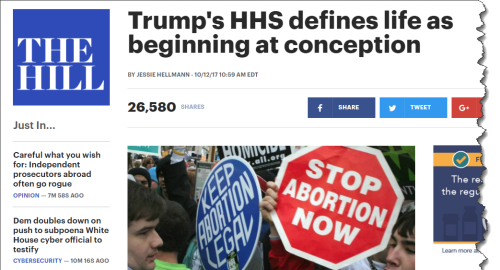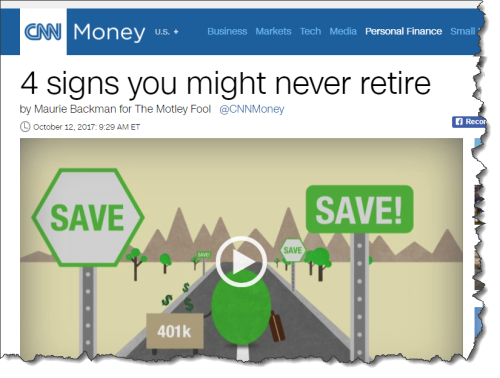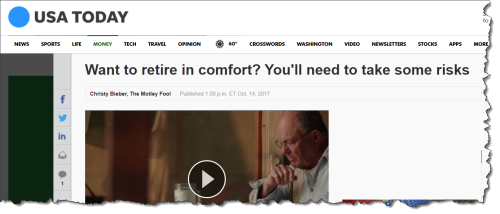James L. Paris's Blog, page 54
October 20, 2017
Trump Administration: Life Begins at Conception
Although Donald Trump was clearly the preferred choice over Hillary Clinton for many conservatives in the 2016 presidential election, there have been lingering concerns about whether Trump was really going to govern in the fashion of a genuine conservative.
While there have been moments since last November that have given many conservatives cause to wonder if Trump would do all that he promised on the campaign trail, his conservative credentials have been beyond reproach in some areas.
The new president very much kept his word, for example, on the matter of appointing a constitutional originalist to the Supreme Court when he nominated Neil Gorsuch to replace the late Antonin Scalia.
And, most recently, Trump has demonstrated his clear embrace of the pro-life wing of the party. According to The Hill, the U.S. Department of Health and Human Services is reflecting at its website a document that outlines a strategic plan for the next four years wherein protection of the unborn is an obvious priority.
For example, describing the administration���s ���Strategic Goal 1: Reform, Strengthen, and Modernize the Nation���s Health Care,��� the document reads, ���While we may refer to the people we serve as beneficiaries, enrollees, patients, or consumers, our ultimate goal is to improve healthcare outcomes for all people, including the unborn, across healthcare settings.���
In another part of the document, ���Strategic Goal 3: Strengthen the Economic and Social Well-Being of Americans across the Lifespan,��� conception as one stage of the human lifespan is referenced:
���A core component of the HHS mission is our dedication to serve all Americans from conception to natural death, but especially those individuals and populations facing or at high risk for economic and social well-being challenges, through effective human services.���
Registering his approval of the administration���s position on life, Rep. Trent Franks (R-Ariz.) said, ���It is vital our government���s definitions of terms correspond to reality. Therefore, I applaud the Trump Health and Human Services��� new strategic plan that defines life as beginning at conception, which any average high school biology student knows to be true.���
By Robert G. Yetman, Jr. Editor At Large
Report: Anthony Weiner Laptop Had 2,800 Govt. Emails from Wife Huma Abedin
Judicial Watch (JW), a non-profit watchdog group that extracts information from the government by filing Freedom of Information Act lawsuits, has learned that former U.S. Congressman Anthony Weiner, recently sentenced to 21 months in prison after being convicted of transferring obscene material to a minor, had 2,800 government documents on his laptop that were sent directly to it by his wife, Hillary Clinton insider Huma Abedin.
In a statement, JW president Tom Fitton said, ���This is a disturbing development. Our experience with Abedin���s emails suggest these Weiner laptop documents will include classified and other sensitive materials. When will the Justice Department do a serious investigation of Hillary Clinton���s and Huma Abedin���s obvious violations of law?���
Judicial Watch���s lawsuit against the State Department was initiated back in May 2015. Prior to that, the group had requested ���All emails of official State Department business received or sent by former Deputy Chief of Staff Huma Abedin from January 1, 2009 through February 1, 2013 using a non-���state.gov��� email address.��� After deeming the State Department non-responsive to that request, JW sued the government.
It is not clear at this time how many of the emails on Weiner���s computer may have already been reviewed by the FBI as part of that agency���s investigation into Hillary Clinton���s use of a private server in an official capacity. However, there is particular interest in laptop because of the suspicion that some of those emails may not have been previously given to the State Department by Mrs. Clinton.
By Robert G. Yetman, Jr. Editor At Large
October 19, 2017
No Surprise Here: Clinton Foundation to Keep $250,000 Weinstein Donation
To what is surely no one���s surprise, the Clinton Foundation will not be returning, re-donating, or otherwise cleansing itself of the money donated to it by the now-notorious Hollywood producer Harvey Weinstein.
According to the Daily Mail, that news outlet was told directly by the foundation on Sunday that the hundreds of thousands received through the years from Weinstein have already been spent on helping women in developing nations and on lowering the cost of HIV medication, and so cannot be returned. Additionally, the Daily Mail says it was told by the foundation that 2014 was the last time a donation was received from Weinstein.
In light of the tremendous scrutiny over the receipt of Weinstein money, and apparently uncomfortable with the queries from the Daily Mail on the matter, foundation spokesperson Craig Minassian took to Twitter later that day to defend the organization���s decision to keep the money, saying, ���Suggesting @ClintonFdn return funds from our 330,000+ donors ignores the fact that donations have been used to help people across the world.���
Although the foundation appears to have worked at cleaning up its act in recent years with regard to the issue of transparency and the acceptance of donations from questionable sources, its history, overall, isn���t great; back in 2006, the foundation took a $25,000 donation from Jeffrey Epstein a convicted sex offender. Additionally, the group���s acceptance of money from countries with a poor record in the area of women���s rights is well-documented.
There���s little question that the foundation���s unwillingness to return the Weinstein donation is conjuring memories of that unfortunate history, and casting the Clintons in an unflattering light once again.
By Robert G. Yetman, Jr. Editor At Large
Four Reasons Why You Might Never Retire (and One���s Actually Not a Bad Thing)
As times change, one core element of the American lifespan that has been in place for as long as anyone can remember may be on the way out.
Retirement.
Per an article over at CNN Money, there are actually four reasons why retirement may well be a stage of life you end up skipping altogether now. One is that you simply expect Social Security to be able to meet your living expenses when you stop working. But if you���re one of those who���s planning exactly that way, you may be in for a rude awakening. CNN says that while Social Security, on average, covers about 40 percent of pre-retirement expenses, most people need about 80 percent of what they were making once they stop working.
Another reason you���ll likely not retire is debt. Carrying debt is now so heavily ingrained in American culture that even seniors are lugging plenty of it around. Golden Aged folks are carrying more credit card debt than ever before, more mortgage debt, even more education debt ��� ugh.
Also, as Americans have gotten used to better, fewer are willing to downsize or otherwise make any significant accommodations to a smaller income when they stop working���so they don���t stop working. Makes sense, but, as an obvious result, retirement will likely remain permanently out of reach for many of these people.
And the fourth reason you may not retire, according to CNN, isn���t a bad reason at all: It���s because you love to work, and can continue to do so on your own terms. Work isn���t what it used to be for many people. There are all kinds of ways to make a living today that are the source of far less stress and hassle than so many jobs were generations ago. Now, it���s not a big deal to be able to work from home, doing what you love, and operating on a more flexible schedule. This redefinition of work has changed the very nature of work for many, so much so that growing numbers of people are now happy to stay on the job through those years that once represented little besides relaxation and leisure.
This said, if you anticipate it���s one of the first three reasons cited that will be keeping you from retirement, then perhaps there���s still time to make the necessary changes so that you have a fighting chance to hang up your work clothes, once and for all. If not, then you can hope that reason #4 ends up suiting you perfectly.
Editor At Large By Robert G. Yetman, Jr.
October 18, 2017
Hepatitis A Outbreak in California Prompts Governor to Declare a State of Emergency
You might remember this space passed along news a few weeks ago about a hepatitis A outbreak in San Diego, one significant enough that authorities were moved to try disinfecting the sidewalks.
Well, things seem to be getting even worse in the land where everything goes.
This past Friday, Governor Jerry Brown was force to declare a state of emergency because of the problem, according to the San Diego Union Tribune:
���The declaration allows state health officials to buy additional doses of the hepatitis A vaccine to try to halt the outbreak, which is already the nation���s second largest in more than two decades.���
Later, the article goes on to say:
���The outbreak began in San Diego���s homeless community late last year, but has since spread outside the region. Los Angeles and Santa Cruz counties are also now experiencing outbreaks.
���So far, 581 people in California have been sickened with the liver virus, more than half of whom have ended up in the hospital. The virus is particularly dangerous, and can be fatal, for people who already have other liver diseases, such as hepatitis B or C.
���Federal health officials said last week that, even with the ongoing efforts to slow the spread of the disease, California���s outbreak could last years.���
It is believed the hepatitis A virus in this case is being transmitted from person to person, although under less unusual circumstances, it���s spread by way of eating contaminated food.
Hepatitis A is virulent and very dangerous. Although California has thrown a bunch of ���Band-Aid��� type solutions at the problem, like installing hand-washing stations and engaging in the aforementioned practice of street sanitization, none are working. The politically uncomfortable truth is that without getting a much better handle on the problem of the state���s homeless and drug addicted resident populations, California is ensuring that the health and welfare of its citizens, overall, will remain far outsized by this and other, similar threats.
By Robert G. Yetman, Jr. Editor At Large
Woody Allen Tries to Clarify Sympathetic Comment Made on Behalf of Weinstein
Woody Allen has weighed in with his thoughts on the Weinstein scandal.
Actually, you probably don���t need to hear any more than that without thinking there���s a punch line coming next.
But there isn���t. He actually has some thoughts about it.
 Weinstein must be banging his head against the wall after hearing accused pedophile Allen ��� a man who, in addition to being on the receiving end of a host of unsavory allegations involving sex and minors, wound up marrying the daughter of former partner Mia Farrow ��� seem sympathetic toward him in comments made to the BBC, as reported by The Washington Post.
Weinstein must be banging his head against the wall after hearing accused pedophile Allen ��� a man who, in addition to being on the receiving end of a host of unsavory allegations involving sex and minors, wound up marrying the daughter of former partner Mia Farrow ��� seem sympathetic toward him in comments made to the BBC, as reported by The Washington Post.
���The whole Harvey Weinstein thing is very sad for everybody involved,��� said Allen. ���Tragic for the poor women that were involved, sad for Harvey that his life is so messed up.���
Poor Harvey. On top of everything else coming down on him, that guy has got to be thinking, ���With friends like these, who needs enemies?���
Allen, like others in Hollywood, has managed to successfully walk between the raindrops of sexual scandal for decades. Big-name actors continue to work with him, he is honored wherever he goes, and people, by and large, still have no problem going to see his films.
As for Allen���s sympathetic Weinstein comment, an ensuing backlash forced the 81-year-old director to issue a statement in which he said, ���When I said I felt sad for Harvey Weinstein I thought it was clear the meaning was because he is a sad, sick man. I was surprised it was treated differently. Lest there be any ambiguity, this statement clarifies my intention and feelings.���
Anyway���
By Robert G. Yetman, Jr. Editor At Large
October 17, 2017
Are Higher-Risk Investments Really Necessary to Retire Well?
It���s tempting to play it safe. After all, the instinct of self-preservation may be the strongest we possess.
So it is with investing. We want to live well, to be sure, but when it comes to our money, the safer the better; always.
That said, a piece over at USA Today informs us that taking more risk in one���s investment behavior serves as the key to a prosperous retirement.
While the article is not necessarily wrong, something more seasoned citizens may now consider is the option of taking a more creative approach to funding retirement���and, as a result, lessening their need to invest aggressively with the resources they have.
There was a time that the standard ���rule,��� from a financial planning perspective, is that everyone should have at least $1 million set aside by the time they stop working. Now, however, that rule may not be as firm, with some financial professionals recognizing saying that while it���s great to have a million bucks stashed, it may not be necessary in order to live perfectly well in retirement, given that it���s now so much easier for older people to make extra income in low-stress jobs working from home.
Let���s say you���re monthly expenses upon retirement are as much as $3,700, as an article from Motley Fool detailed last year. If you can earn $10 hour working from home for 20 hours per week, that comes out to about $860 per month (4.3 weeks in an average month). Move on to Social Security. The average Social Security benefit in 2016 was about $1,350. Between Social Security for you and your spouse, as well as the income from a modest, work-from-home job, then, you���ve got about three-quarters of your expenses covered ��� $3,560 ��� and that���s assuming just one of you is working.
Making these assumptions, you���re already 96 percent of the way to meeting your expenses, and you���ve taken nothing from savings yet.
So let���s talk about savings. Withdrawing from savings at the rate of three percent per year means you would be taking out $2,500 per month. Do you need $2,500 per month if you���re already generating $3,560 from these other sources? Do you even need half that amount ��� $500,000 ��� which, at a withdrawal rate of three percent per year, would generate $1,250 each month in investment income?
Maybe not.
Everyone���s circumstances are different to be sure, but you get the picture. Yes, in general, the more you want set aside in savings, the more time you���ll have to spend in equities. That said, it���s important to ascertain, as soon as possible, what your particular financial profile will be when you retire, and work backwards from there. You may find that you just don���t have to expose your dough to as much investment risk as some are suggesting���because you simply won���t need as big a nest egg as you previously thought.
By Robert G. Yetman, Jr. Editor At Large
Populist Firebrand Bannon Touts ���Economic Nationalism��� at Assembly of Christian Conservatives
The Family Research Council put on the 12th edition of its annual Values Voters Summit in Washington, D.C. this past weekend, and Steve Bannon, once thought to be the power behind the throne in the Trump administration and now Executive Editor over at Breitbart News, appeared on stage to make a powerful case for ���economic nationalism��� in front of the assembled.
Although Bannon resigned as White House chief strategist back in August, populist conservatives who���ve been Donald Trump���s greatest supporters still see Bannon as most representative of the ideas in which they believe. Indeed, many see Bannon as being the key to Trump���s victory last November, and those Christian conservatives gathered in Washington over the weekend gave him a very warm reception.
As reported by The Christian Post, Bannon, during his appearance, dismissed the mainstream media���s attempt to paint the centerpiece of the so-called ���alt-right��� movement as ethnocentrist, and declared that what it���s really about is economic nationalism.
���Economic nationalism is what combines us together. Economic nationalism is understanding that we are going to bring those jobs back. It's not the second law of thermodynamics why [the jobs] left,��� said Bannon. ���There is no law that took those jobs to Asia and those factories to Asia and left us with gutted communities and opioid addicts. That was human agency. That was decisions, our men and women, that did that.���
As noted, Bannon was well-received at the event, but some in the conservative community, uncomfortable with what they perceive as his ties to white nationalism, were less than thrilled that he was invited to appear at all. One person, National Review senior writer David French, flatly asked on Twitter, ���Why is a Christian organization hosting this vile man?��� Additionally, John Murdock, who worked in D.C. for over a decade and presently teaches at a Christian law school in South Korea, publicly chided FRC president Tony Perkins and Ralph Reed recently for their support of Bannon, saying that he ���has been belting out his discordant song for a while,��� and that he���s ���now inviting frustrated Christians to hum along.���
By Robert G. Yetman, Jr. Editor At Large
October 16, 2017
Las Vegas Shooting Conspiracy? Still More Questions Than Answers
Jim discusses the latest on the Las Vegas shooting - Police ban independent reporters from press conferences, security guard ���hero��� Jesus Campos is missing, shooter's house was unguarded and broken into through front door, Laura Loomer goes to Campos' home and family can not confirm that Campos is OK (home guarded by armed security), freight elevator only allowed to be used when accompanied by security, Kymberly Suchomel dead after giving statement of seeing multiple gunmen, more and more evidence mounting of a 2nd shooter, Stephen Paddock and Jesus Campos no digital footprint���, phones returned wiped clean of pics and videos, and picture of hallway where 200 rounds were shot, but no bullet holes.
Former CIA Agent - Las Vegas Shooter Most Likely Turned By A Terror Group
Former CIA agent, Eric Burkhart, joins Jim to discuss his book Mukhabarat, Baby! My Life as a Wartime Spy for the CIA. On the Las Vegas shooting, Burkhart believes that the most likely scenario is that the shooter was turned by a terrorist organization, and that he had assistance. In addition to sharing stories from his career in the CIA, he provided insight on how he was poisoned by a foreign operative, myths about working for the agency, how CIA officers use covers when working overseas, and much more. Burkhart also shares his own theory on the JFK assassination, saying that he believed there was a second shooter.












